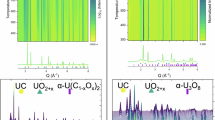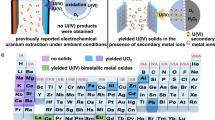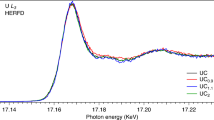Abstract
TERNARY compounds of uranium and carbon with the first row elements of group VIII A in the periodic table have been known for some time. This is because of the relevance of the appropriate ternary phase relationships to the use of Fe, Co and Ni as canning materials for nuclear fuels. The compounds UFeC2, UCoC2, UNiC2 and U2NiC3 have been described1,2.
This is a preview of subscription content, access via your institution
Access options
Subscribe to this journal
Receive 51 print issues and online access
$199.00 per year
only $3.90 per issue
Buy this article
- Purchase on SpringerLink
- Instant access to the full article PDF.
USD 39.95
Prices may be subject to local taxes which are calculated during checkout
Similar content being viewed by others
References
Anselin, F., Calais, D., Dean, G., and Yan Craeynest, A., CR Acad. Sci., 257, 3916 (1963).
Passefort, J. C., Anselin, F., and Calais, D., Science of Ceramics, 4, 421 (1968).
Farr, J. D., and Bowman, M. G., Carbides in Nuclear Energy (edit. by Russell, L. E., et al.), 184 (Macmillan, London, 1964).
Krikorian, N. H., Wallace, T. C., Kruppa, M. C., and Radosevich, C. L., J. Nucl. Mat., 21, 236 (1967).
Author information
Authors and Affiliations
Rights and permissions
About this article
Cite this article
HAINES, H., POTTER, P. Ternary Compounds of Uranium–Carbon and the Group VIII A Elements. Nature 221, 1238–1239 (1969). https://doi.org/10.1038/2211238b0
Received:
Published:
Issue date:
DOI: https://doi.org/10.1038/2211238b0



